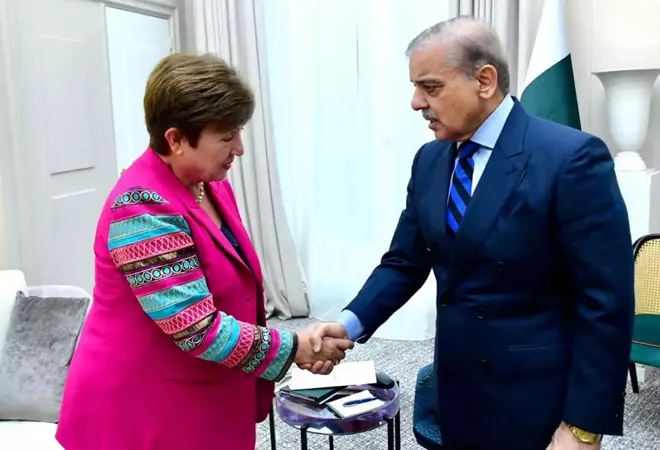-
CENTRES
Progammes & Centres
Location
The Stand-By Agreement from the IMF staves off the possibility of Pakistan defaulting on its debt, but only temporarily, not indefinitely.

This brief is part of the series, Pakistan: The Unravelling
The US$ 3 billion Stand-By Arrangement (SBA) agreed between the International Monetary Fund (IMF) and the Pakistan government is being celebrated as a great achievement in Pakistan. It is, however, not clear whether the SBA is an Eid gift from IMF to Pakistan or the sacrifice of the Pakistani people offered to the IMF by the Shahbaz Sharif-led hybrid 2.0 regime. The SBA itself stands testimony to the fact that the Enhanced Funding Facility (EFF) programme ended unsuccessfully. Instead of rescuing the EFF, the IMF has agreed to a nine-month SBA which is now Pakistan’s 23rd IMF programme. Given the state of the Pakistan economy, the country will most likely enter into its 24th programme next year. At one level, it is an indictment of IMF’s failure to enforce reforms on Pakistan; at another level, it is a statement on how Pakistan negotiates: Take things to the edge of the abyss playing good cop-bad cop, and if nothing works, go on your knees, give in on everything, take what you get to live to fight another day.
The government has been forced to raise an additional Rs 215 billion in taxes in the revised budget that was passed by the National Assembly.
To be sure, the SBA staves off the possibility of Pakistan defaulting on its debt, but only temporarily, not indefinitely. While Pakistan might have succeeded in kicking the can down the road, the breathing space it has got is not going to come cheap. Already, the government has been forced to raise an additional Rs 215 billion in taxes in the revised budget that was passed by the National Assembly. The policy interest rate has been raised by another 100 basis points by the State Bank of Pakistan (SBP) to 22 percent. Strangely, even though the interest rate has been jacked up by 1 percent, the debt servicing estimates for the fiscal year remain unchanged. According to some calculations, a 1 percent interest rate hike adds about Rs 200-225 billion to the debt servicing cost. Given that inflation is not coming down, the SBP could be forced to raise interest rates further for the IMF programme to continue smoothly.
But there is more bad news. The IMF is insisting on revising electricity tariffs. According to reports, Pakistan will have to raise the base power tariffs by around Rs 8 per unit—from around Rs 24 to Rs 32. Add to this the various charges, surcharges, levies, and taxes and electricity will become extremely expensive. But the IMF is insistent because Pakistan's electricity economics is totally unsustainable with circular debt rising exponentially to Rs 2.6 trillion. Apart from electricity tariffs, Pakistan will have to hike the petroleum levy by around Rs 10 per litre. Clearly, the cost of this adjustment will be borne disproportionately by the non-elite, salaried sections of society. For the elites, the party never ends.
Pakistan will have to raise the base power tariffs by around Rs 8 per unit—from around Rs 24 to Rs 32. Add to this the various charges, surcharges, levies, and taxes and electricity will become extremely expensive.
Needless to say, the SBA is not the end to Pakistan's problems. In the financial year starting on 1 July, Pakistan will need around US$ 32 billion to stay afloat. This number includes around US$ 25 billion for debt servicing and around US$ 7 billion to bridge the current account deficit. The IMF arrangement will unlock funds from bilateral and multilateral donors, but the economy will remain on a knife’s edge. It is almost a given that Pakistan will have to go in for another long-term IMF programme next year. The conditionalities of that programme are likely to be even stiffer than the last programme.
Politically, the SBA will be used by the Shahbaz Sharif government as a crowning achievement of having avoided default. While it is true that the cost of the SBA is nothing compared to what the economy would have to bear if there was default, this logic is not really going to work on the street, certainly not in an election year. Even so, with the political opposition in the form of Imran Khan having virtually been expelled from the political arena, the ruling dispensation is all set to return. The face, form, and shape of the next government could be different, but it will be more or less similar to the current coalition with a few additions (read turncoats from Imran’s ranks who have formed a new party).
The IMF arrangement will unlock funds from bilateral and multilateral donors, but the economy will remain on a knife’s edge.
The last minute deal has probably also ensured that any prospect of the military being forced to take over and rule directly instead of through proxies like Shahbaz Sharif has now receded. There will, however, be a question mark around the future of Finance Minister Ishaq Dar who made a complete hash of things and nearly pushed the country over the edge with his abrasiveness, voodoo economics centred around an over-valued Rupee, and bull-in-a-China-shop approach towards the IMF. Despite him being a close relative of Nawaz Sharif, his appointment as the Finance Minister if Nawaz Sharif’s party leads the next ‘elected’ government will be quite surprising.
Sushant Sareen is Senior Fellow at Observer Research Foundation.
The views expressed above belong to the author(s). ORF research and analyses now available on Telegram! Click here to access our curated content — blogs, longforms and interviews.

Sushant Sareen is Senior Fellow at Observer Research Foundation. His published works include: Balochistan: Forgotten War, Forsaken People (Monograph, 2017) Corridor Calculus: China-Pakistan Economic Corridor & China’s comprador ...
Read More +